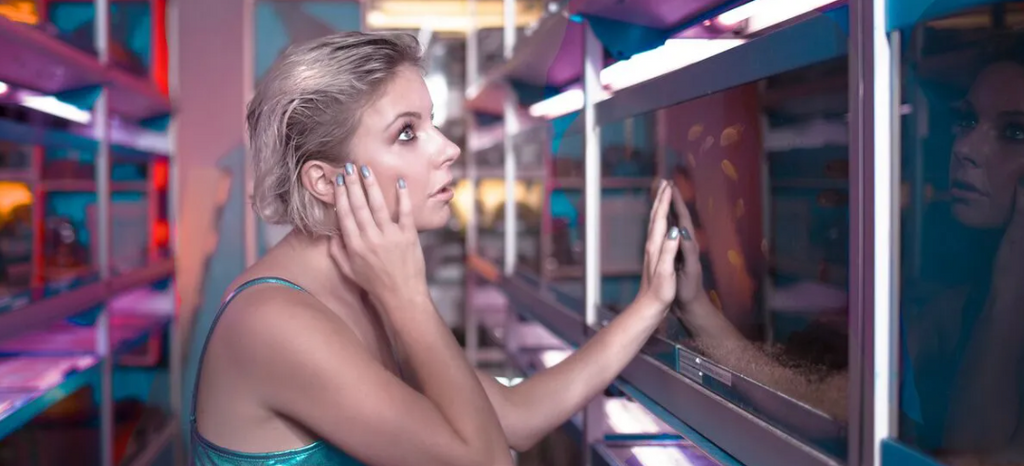Victoria Christina Hesketh, better known by her stage name Little Boots, is an English electropop singer-songwriter and DJ. Her new EP,Burn, debuted at Number 1 in the Electronic Charts in the US, UK, and Canada. Ahead, she tellsGirlboss what it’s like to be a female producer in the notoriously sexist music industry—and what she’s doing to change the game.
For years, I was told that female producers didn’t exist. Well, my new EP was made by women from concept to release. So I guess we must.
When I set out to make Burn, it wasn’t with a hard and fast rule or as a gimmick. I saw it as an opportunity, and a way to enforce inspiring creative limitations.
I reached out to female DJs I admired, talked to my friends, and put an ask on “shesaid.so,” a hugely helpful and vibrant network of women in the music industry. I was immediately flooded with a deluge of female producers of all genres that I had no idea existed.
The music industry is notoriously imbalanced, but production is a field where the figures are especially dire; less than 2% of recorded albums credit female producers. Male execs blame a lack of role models, too few women entering audio engineering school, women not asking for credits, or a “female lack of interest.” (The latter I find hard to believe.)
“I can’t count the number of times I’ve been mansplained to, told I only got gigs because of the way I look, or criticized for not being a ‘real DJ.'”
But I can understand why women who are interested in production might get burnt out on it. For one, the boys’ club is so exhausting. I remember touring with my all-female indie band in college; we drove ourselves across the country and hauled our amplifiers and equipment through teeming nightclubs while being heckled and harassed. If something wasn’t working during soundcheck, the countless male technicians would ask if we’d “tried turning our equipment on and off again.” That was so helpful because of course we had never considered it!
I can’t count the number of times I’ve been mansplained to, told I only got gigs because of the way I look, or criticized for not being a “real DJ.” One time, I got trolled for standing next to a laptop in a photograph (which, to DJ purists, would mean I didn’t know what I was doing). I’ve never used a laptop to perform; as a matter of fact, it belonged to my warm up DJ… who was a dude.
And even though I know I am talented and pride myself on my technical ability, I suffered from impostor syndrome for years, like a lot of women.
“I suffered from impostor syndrome for years… Little by little, I’ve become comfortable voicing my opinions and calling the shots.”
I’m what you would call a “synth nerd;” I’ve been experimenting with tools like Japanese sequencers and laser harps forever. I have a home studio where I write and record on a near-daily basis. But when you put me in a studio session with a producer, I’d lose my confidence. If you described me as a producer rather than a singer, I’d feel embarrassed. Little by little, I’ve become comfortable voicing my opinions and calling the shots. But it can be awkward and intimidating to bare your soul and make songs in dark rooms with strange men and their egos.
Getting through that awkwardness comes down to confidence. It’s well-known that men apply for jobs they’re underqualified for and women apply for jobs they’re overqualified for. This is absolutely the case in musical production. Women feel the need to earn their place, often studiously working their way up the ranks through audio school, then working as an engineer for years, before finally daring to sit in the producer chair and take a record credit. To guys, heading straight to their studio kingdom and gobbling up the credit seems to come way more naturally. It’s well-known some male record industry executives will insist on getting a producer credit without having been anywhere near the room when the record was made.
“In music, having a personal connection is critical. When you’re working with other women, it’s often immediate.”
For my own EP, I eventually decided to work with four producers: Joyce Muniz, Lauren Flax, Planningtorock, and Cora Novoa. I also found an amazing mixer, Marta Salogni, who was in the middle of working on the latest Bjork album. We were all in different parts of the world, so working together remotely required some patience and communication. Since writing the EP, I’ve hung out with several of them as our paths have crossed—and the immediate warmth, friendship, and passion we share has been so moving. In music, having a personal connection is critical. When you’re working with other women, it’s often immediate.
I hope that in choosing to work like this, I’ll help shine a light on the many talented female producers out there and encourage other women to pursue production. Little by little, the music industry is changing. From critical organizations like Women in Music and Beats for Girls, increased press coverage of and credits for women and non-binary producers on records, female DJs gracing covers and billboards, and promoters making specific efforts for diverse billing (see: Moogfest’s female-focused lineup and Smirnoff’s “Equalizing Music” initiative), the industry is finally taking steps to acknowledge the work we’ve been doing all along. It’s time for us to be seen and heard.



